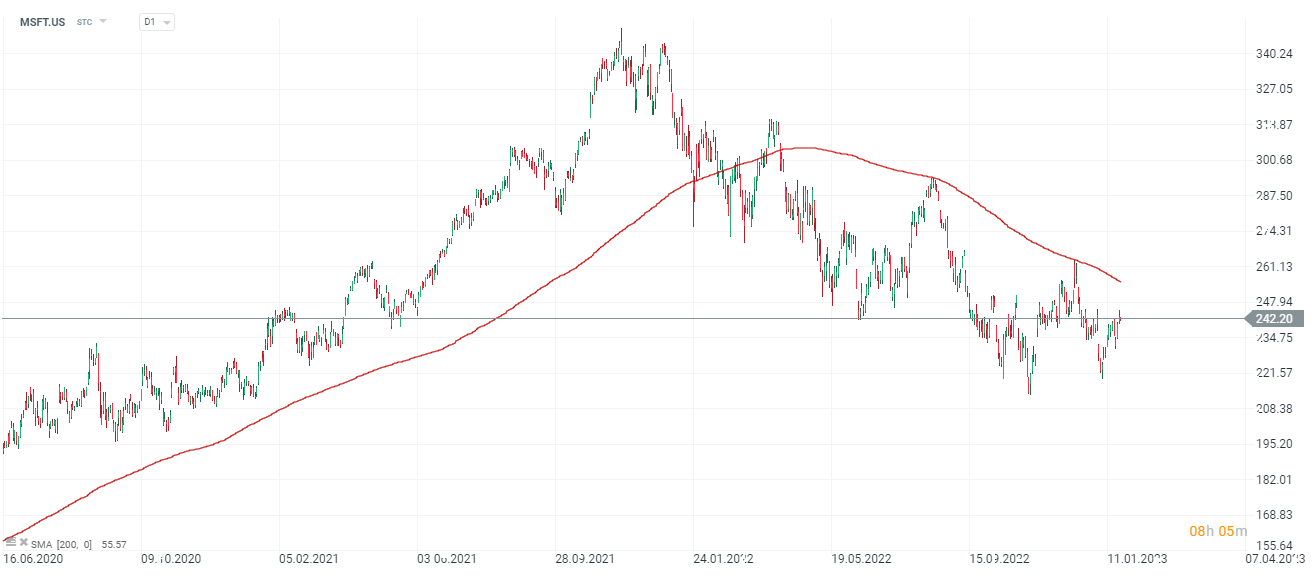Silicon Valley giant Microsoft (MSFT.US) will show its Q4 2022 results after today's US trading session. Wall Street expects the slowest revenue growth in nearly 6 years. What to expect in Microsoft's results and what will analysts pay attention to? A better-than-expected report would give markets hope that reports from other BigTechs could beat expectations.
Forecasts
Revenue: $52.96 billion (2.4% y/y growth)
Earnings per share (EPS): $2.30 vs. $2.48 in Q4 2021 (9% y/y decline)
- Analysts expect increased spending on cloud computing (Azure) by inflation-hit companies to slow and hit Microsoft's high-margin business. The end of the pandemic (lower demand for remote work and education) has brought lower cloud and software (Windows) demand due to lower PC sales (global PC shipments fell 29% in Q4);
- According to Vesible Alpha estimates, Azure is expected to grow by 31% in Q4 (the lowest growth since Microsoft started reporting it, in 2015). In Q3 2023, Azure growth slowed to 35% from 50% a year earlier, and it seems that a result higher than 35% y/y today would satisfy the market;
- The mood in the technology industry ahead of earnings season is not the best, which may be due to a wave of job cuts due to the projected slowdown. Microsoft announced layoffs of 10,000 employees (less than 5%), and cut IT spending although, in the eye of analysts, demand for the company's services and products will remain high.

Analysts' ratings on Microsoft shares (MSFT.US) as of January 19, 2023. Bulls clearly prevail, and the number of buy recommendations has not changed significantly since 2021. Source: capital.com
Cloud computing
- Analysts at RBC Captital Markets noted that many companies are slowing down data migration to the cloud and negotiating the price of existing plans. Concerns about demand were also expressed by UBS analysts according to whom the data that was easiest to move into the cloud - are there already. Last week, Microsoft CEO Satya Nadella indicated that companies are being cautious because of recessionary concerns;
- The risk of recession continues to affect the operations of thousands of companies, which is why Microsoft has already announced that it expects revenue from 'cloud computing' to slow down. Analysts will be paying particularly close attention to the company's announcements for the rest of 2023, during which a recession is not ruled out in the US. On the other hand, the cloud business is in a long-term uptrend, and a complete collapse in demand amid technological advances remains unlikely.
Artificial intelligence
- Microsoft is cutting costs and investing in new projects that could consolidate or increase its competitive advantage in the long term. Analysts will pay particularly close attention to OpenAI (ChatGPT) because the company has made unprecedented investments in artificial intelligence in recent months;
- According to Wedbush Securities, the investment in AI is a strategic move by Microsoft because more use cases will result in unprecedented demand for artificial intelligence, and more advanced search tools could take away market share from Alphabet (GOOGL.US) over time. Still, the cost per query for ChatGPT is much higher than the competition;
- Microsoft plans to increase its investment in OpenAI by an additional $10 billion, at which point it will receive 75% of the company's profit share until the total return on its investment, after which it will retain 49%;
- It remains unclear whether Microsoft's $75 billion acquisition of gaming giant Activision Blizzard (ATVI.US) will come to fruition in the face of antitrust comments from regulators (FTC).

Microsoft (MSFT.US) shares, D1 interval. The SMA200 average, which runs around $255, is still the main resistance. On the other hand, we can see that the price has formed a strong base around $220 by which, in case of successful results, the bulls can head towards a retest of the SMA200. Source: xStation5

STM is growing stronger thanks to a new partnership with AWS!

Kongsberg Gruppen after earnings: The company catches up with the sector

Market wrap: European indices attempt a rebound after Wall Street’s record selloff 🔨

Morning wrap: Tech sector sell-off (06.02.2026)


